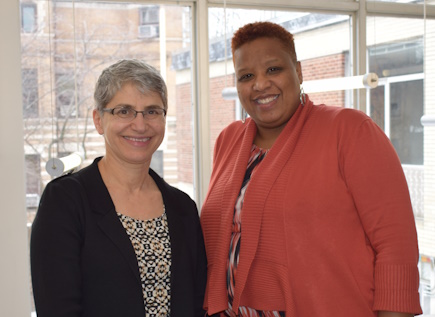New Screening Brief Intervention Referral to Treatment (SBIRT) initiative provides free Continuing Education to WSU students and community members
In 2015, Wayne State University was the first university in the state of Michigan to receive a Substance Abuse and Mental Health Services Administration (SAMHSA) grant for training School of Social Work (SSW) and nursing students in Screening Brief Intervention Referral to Treatment (SBIRT). The goal of the training was to prepare students and professionals to assess patients for substance use behaviors. Recently, WSU received another grant that will provide free Continuing Education (CE) to students and the community. Eric Shimmel, program coordinator for the Opioid Workforce Expansion Program (OWEP), Anwar Najor-Durack, social work assistant professor clinical and assistant dean for student affairs, and Umeika Stephens, nursing assistant clinical professor and Psychiatric-Mental Health Nurse Practitioner graduate specialty coordinator, are working together on the initiative. Stephens and Najor-Durack are Co-Principal Investigators for OWEP.
“The OWEP and Behavioral Health Workforce Education and Training (BHWET) programs have partnered to update our asynchronous SBIRT course. The course will introduce students and clinicians to SBIRT. Our website will also provide resources to assist clinicians and community members,” Shimmel said.
Stephens, along with Social Work Assistant Professor Suzanne Brown, are Co-Principal Investigators on the BHWET grant. Kate Oleksiak serves as the project coordinator, working closely with community members, students and researchers.

SBIRT is an integrated, public health approach to delivering early intervention and treatment services for persons with—or are at risk of developing—substance use disorders. SBIRT is designed for use in primary care centers, hospital emergency rooms, trauma centers, and other community settings that are a person’s first, and sometimes only, contact with the healthcare system.
A new asynchronous SBIRT course, launching this month, will be broken down into three modules: Screening; Brief Intervention; and Referral to Treatment.
Allison Herrst and her team have been using the SBIRT training course since 2020. Herrst is a WSU graduate and Supervisor of Peer Support Services at Growth Works, a nonprofit organization that provides youth and family support and addiction counseling in Wayne County.
“The course has helped us gain the skills necessary to provide a substance use screening and brief intervention for all our clients,” Herrst said.
“During the first launch, we trained over 800 students and healthcare professionals to use SBIRT. We also created the self-paced online course as part of our sustainability plan. The course was recently updated with new content and is being relaunched to support students, alumni, health professionals, and agency partners,” Najor-Durack said.
Herrst took the lead in revamping the course.
“SBIRT has been such a useful resource for my staff for years, so being able to update the course has been extremely rewarding. “Having been through the course many times, I had a deep understanding of the content and which aspects of the training were most useful for providers. The new updated course expands on this, to ensure that all content is relevant, current and useful to anyone who is taking the course. SBIRT has always given me and my team of peer professionals a better understanding of how to engage clients in a conversation about their substance use. The new course will help all providers, not just those working in the substance use field, to develop their skills in this area and become confident utilizing SBIRT in their practice,” Herrst said.
“Dr. Stephens, Dr. Brown and I were fortunate to work with Eric, Kate and Allison, who did an outstanding job in updating this course with fresh content and graphics to make it easier to navigate and successfully complete. Students and alumni will benefit from the training as it will allow them to treat persons with substance use disorders as well as those who are at risk of developing these disorders. The skills learned will allow them to be better prepared for the job market and to support clients who struggle with substance use challenges,” Najor-Durack said.
Learn more about SBIRT, access resources, and complete the course to earn two free continuing education clock hours by visiting the SBIRT website.
Author: Laura Hipshire laurahipshire@wayne.edu